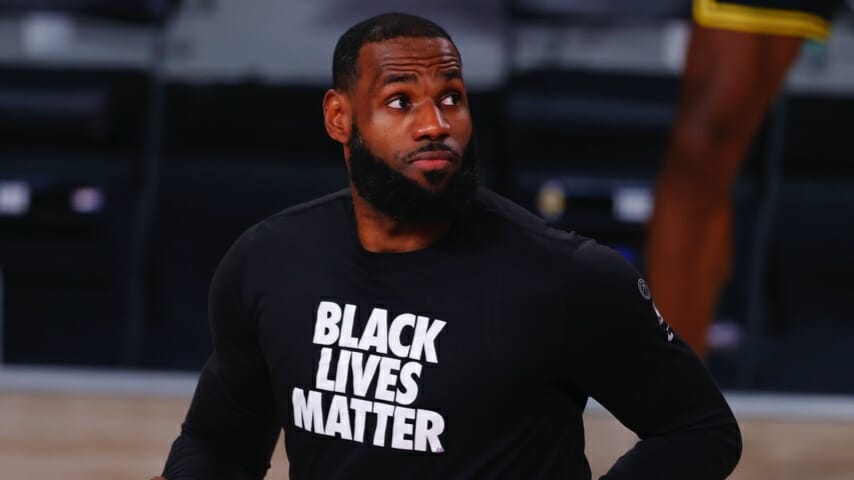King James’ Profanity Prayer
Photo by Kevin C. Cox/Getty
In our days of easy access to the words and images of others and instantaneous powers of self-publication possessed by anyone with Internet access and, for instance, a Twitter account, having a quick look at an activated screen can feel a little like trying to keep your wits about you while staring into the spray of a broken fire hydrant. We don’t always know how to take it, this horde of human expression coming at us all at once. What does it all mean? Who’s to say? Context is hard.
In my efforts to keep my third eye open lest I mistake an emotional reaction for a meaningful response, I have a saying I borrowed from William Blake for thinking through words or images which might initially trigger me: The voice of honest indignation is the voice of God. Slow the tape and mull that one over a little: The voice of honest indignation is the voice of God. This doesn’t mean I’m going to write out all my frustrations in the blank pages of Bibles and decree them sacred writ, but it does mean I’d be right to take very seriously every honest word that comes at me, even if someone’s word choice might initially offend. Blake knows something about the doors of perception. Is there information to be had in the fact of what offends me and doesn’t? Oh my yes. Might someone else’s expression of very legitimate anger be a source of moral revelation which demands something of me? I sure think so.
Many Americans scrolling through Twitter last Wednesday afternoon likely happened upon these words: “FUCK THIS MAN!!!! WE DEMAND CHANGE. SICK OF IT” No context was provided, and none was required. This is LeBron James. We know his tone and his bodily commitment to the safety and thriving of Black people. King James is voicing an anguished, public reaction to the latest disclosure, the catastrophic clockwork, of more white supremacist terror footage. As Jacob Blake tried to enter an SUV with his three sons in the backseat, police in Kenosha, Wisconsin, shot him the back seven times. He is, according to his father, paralyzed from the waist down and, up until recently, was hand-cuffed to his hospital bed. With over 41 million followers, James’ online transmission struck a chord and has been RT’d, at last count, 312,000 times. How does one measure civility when thinking through this phenomenon? Is King James out of line? Does this just add to the noise?
One can stop there with a philanthropist athlete’s online signal flare, bristle at the language, mimic the popular line that he should stick to basketball and scroll on. But to do so is to miss an invitation to look longer, see further and feel more. To take affront at the sight of it, as if King James is the one behaving inappropriately, is to deny oneself deeper recognition of King James’ longer, more righteous game. By clicking “Send Tweet,” James was strategically contributing to the gathering momentum of courage within which the Milwaukee Bucks would boycott Game 5 and WNBA players appeared with shirts with Jacob Blake’s name on the front and seven bullet holes printed on the back. He was also setting a table for the public expression of dismay, despair and discernment within the professional sports community. Grief and candor, in the hours that followed, were the norm. I would argue that King James played a profound leadership role and, via tweet, set a more open scene of free expression, a broader horizon of expectation.
Within hours, the Clippers’ coach Doc Rivers saw fit to publicly comment upon the kind of rhetoric coming out of the RNC convention. He noted that, among supporters of the Trump administration, he kept hearing about fear. The stoking of anxiety over what might happen to white people when law enforcement is made morally accountable, Rivers argued, makes no sense: “We’re the ones getting killed. We’ve been hung. We’ve been shot…It’s amazing to me…why we keep loving this country, and this country does not love us back.”
-

-

-

-

-

-

-

-

-

-

-

-

-

-

-

-

-

-

-

-

-

-

-

-

-

-

-

-

-

-

-

-

-

-

-

-

-

-

-

-








































